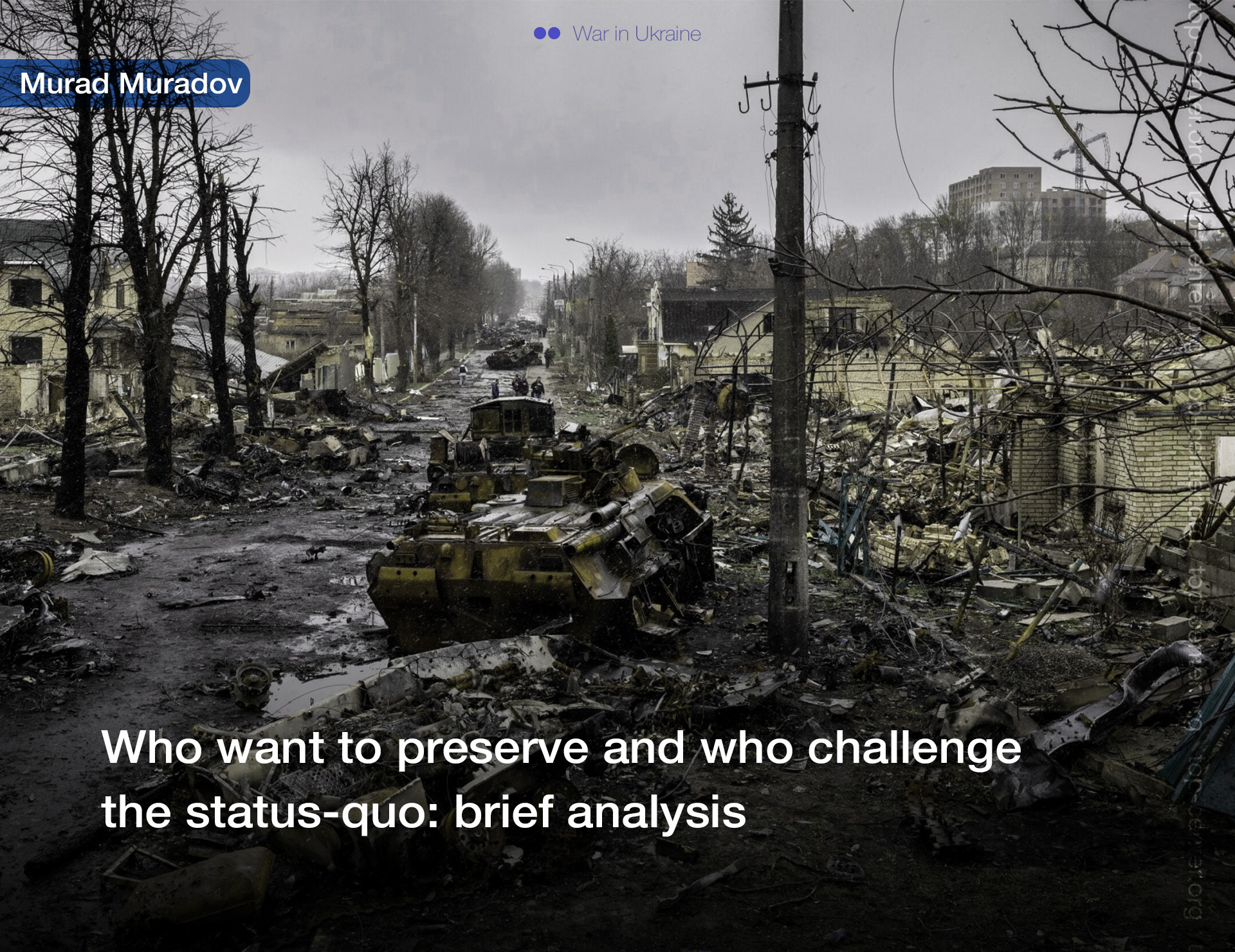Who want to preserve and who challenge the status-quo: brief analysis

There is one very grave crucial mistake however often committed by commentators trying to explain the global chessboard in recent years: calling Russia a status-quo challenger. The problem is that on the surface, it is certainly true: Russia had lost its status of a superpower on par with the US and wanted, under Putin, to improve its actual standing.
However, the reality was much more complex. What Moscow has been trying to do all these years, was pure restoration which is a very different thing from the status quo challenging. In fact, for Putin, the ultimate goal was not even to restore the superpower parity (he probably understood, at least until very recently that this is impossible). What he wanted- as a deeply conservative and unimaginative imitator- was to prevent any powers other than U.S. from entering this club. In other words, Russia in his view could well remain the second power after U.S.- as long as others are even lower on this food chain. Feeling that the balance is shifting not in Russia's favour, Putin decided that he has to stop this shift when Russia's relative power is still more or less tolerable for him and his circle. Hence stems his maniacal desire to speak in earnest only with Washington, to discuss matters of post-Soviet states and Europe exclusively with Washington, although it has been both obviously unnatural and detrimental to Russia's relations with the outside world. Even Moscow's policy of sowing some discord within the West, funding fringe parties and cultivating anti-elite movements within Western societies was not part of a large plot for nurturing friendly powers in the West but rather desperate attempts to attract the U.S. attention, as if trying to explain that only Russia can be a credible сounterpart when it comes to global issues. Putin's dream has always been to "freeze the moment" and eternalize the comfortable and predictable state of the world.
But here comes an interesting moment. Another major status-quo actor in the world is nobody other than U.S. Washington has long been trying to prevent the challenges and alternatives from rising rather than to offer new visions and target new goals. And this notion is strongly visible in President Biden's strategy, including his approach to Ukraine. Many analysts have doubted his sincerity on the security of Ukraine and suspect he is not that much interesting in helping it to push Russia back. It seems to me that Biden's administration initially aimed at inviting Russia to achieve some limited victory in Ukraine at the cost of multiple sanctions and well-deserved reputation of a global bogeyman, when divided Ukraine would have played a role of the new frontier akin to Germany in 1949-90. This would have somehow restored the condition of the world familiar to Biden and his likes - the Cold War with America as an unconditional leader of the free world, with all the allies clinging to its protection from the unpredictable and aggressive Russia. It is this shared desire to restore the playground of the past that created an impression of Washington and Moscow sharing some sinister plan.
So, the fact that we see a serious and determined support to Ukraine can be explained, of course apart from the latter's bravery and resilience, only by the fact that there are third powers indeed willing to break the status quo and to exclude the return to the past. Britain, with its alliance with Turkey, Poland and some other states is such a power. Brexit has triggered a string of processes that have been gradually shaking the world and changing its configurations. This explains why it has кecently been so conspicuously proactive and resolute. Europe here is caught in between: on one hand, it thoroughly lacks muscles for taking initiative amid the largest global turmoil since 1945, on the other hand, European leaders clearly understand that the success of Russia/US would mean its growing decline and a downgrading to the third-rate power level. So they try to escape this scenario, although clearly lacking a strategy for doing so.
And finally, China. Let's not forget that it's a true (not fake) status-quo challenger in today's world. That's why, despite any claims of friendship with Russia, it is interested in Moscow's success no more than UK or EU. Thus, estimating the configuration of interests in the current conflict judging by the past example is misleading: there are no true alliances right now, but rather configurations of сongruent and conflicting interests which may soon crystallize into very unexpected blocks. And to understand the interests and standings of other actors in this growing conflict, it is necessary to estimate whether they are happier with the old world order or would like to challenge it.







